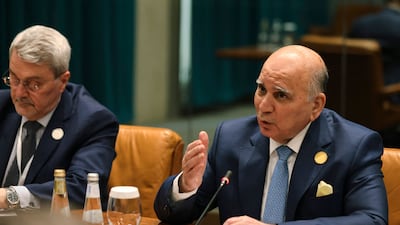Iraq’s economy cannot thrive if the country’s security is not ensured, Foreign Minister Fuad Hussein told British business leaders on Monday.
He said Iraq had come a long way since the ISIS invasion of 2014 and was now secure but challenges linked to perceptions of the country and its reliance on fluctuating oil revenue remained. “Investment needs security,” said Mr Hussein at the Arab British Chamber of Commerce in London. "When there is security in Iraq, then we can talk about better economic ties."
The event was part of Mr Hussein’s two-day trip to London, where he was expected to meet his British counterpart James Cleverly and other cabinet ministers. The meetings are part of the Iraq-UK strategic partnership, an agreement signed in 2021 to underscore British support for Iraq’s security and economic reforms.
Iraq’s historic relationship with the UK – which dates back to the British colonial mandate and Iraq’s foundation in 1921 – lies at the heart of the agreement. “The British were in Iraq from day one, even though we’ve had our ups and downs,” Mr Hussein said.
Regarding the pending security issues, the two countries would be "exchanging information about human trafficking, drugs trafficking and money laundering," he told The National but declined to comment on specific cases.
He also hoped to change the Foreign, Commonwealth and Development Office’s guidance advising against all travel to Iraq and against all but essential travel to the Kurdistan Region of Iraq. This had influenced foreign investors’ “perceptions” of the country, he said, and was a major impediment to investment from overseas.
Iraq’s oil revenue contributes to 90 per cent of the state budget, which can lead to fragility. “When the oil price is down, you’ve got a huge problem,” Mr Hussein said.
He said he hoped Iraq would become a "gas country in 3 to 4 years", having signed an agreement with Total in April to recover flared gas on three oilfields to supply power generation plants. Iraq currently relies on Iranian gas for 43 per cent of its electricity needs, he added.
Mr Hussein also aims to develop Iraq's tourist industry. "Millions of religious people are visiting Iraq's holy places, Shias, Sunnis, Yazidis and Christians," he said.
Among the challenges to Iraq's economic reform plans, he said, was moving on from the “so-called socialist system” of previous governments, which had nationalised the oil sector and inflated the civil service. “For 40 years, Iraq was very much centralised. It will be difficult to change this culture,” he said.
He said vicious circle had emerged, in which public sector jobs, a workforce of 6 million people, were hindering the growth of the private sector. “The youth wants to be employed by the government because it guarantees them a job for the future, but also because of the weakness of the private sector,” he added.
The “culture of centralisation” was particularly entrenched in the oil industry, Mr Hussein said. “The oil sector was like the military and intelligence services under Saddam,” he said. “It makes it difficult to create a new private economy.”
Iraq’s economy was destroyed by the UN-led embargo of the 1990s and 40 years of conflicts, beginning with the Iran-Iraq war. “War destroyed our infrastructure – I don’t just mean buildings and bridges – but our health care, education and agriculture,” the Foreign Minister said. “Our culture was replaced by the culture of war. For those who survived the war, the question is how they survived.”
Mr Hussein outlined his hopes for Iraq’s democratic future. “We are on a good path,” he said.


